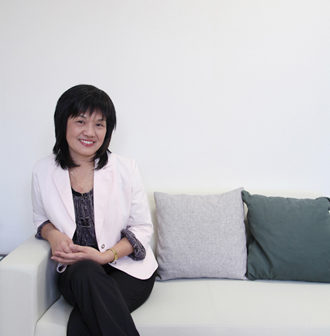Both Dr. Stephen-Claude Hyatt from International SOS and Regina Ho from OASIS International Hospital are candid about the single most-encountered issue seen amongst expat couples in their mental health practices here: infidelity.
Ho is a licensed counselor with experience studying and working in Hong Kong, the UK, Australia, and China. Her major areas of counseling include relationship issues, and she regularly conducts assessments for both pre-marital and marital couples. She says: “The husband typically engages in very long hours at a high-pressure job, while the wife sometimes seems to lose her identity. She leaves her job, comes here, and her old support network is gone. They are less available to support each other, because both are struggling.”
Dr. Hyatt is head of the Mental Health Department at International SOS. He has a PhD in Clinical Health Psychology and conducts pre-marital, marital, and group therapy. “I see a large number of couples here dealing with the consequences of infidelity,” he says.
Chinese business culture doesn’t help. Late nights, hard drinking, and dubious “entertainment” are to be expected here. Many business deals are closed in karaoke bars, which often feature “karaoke girls” who perform sexual services as well as the duties of a waitress. During business trips, an obviously foreign man may receive a call in their hotel room asking if they want a “massage.”
A Conflict by Any Other Name …
How can couples pre-empt these issues? They can start by recognizing
that moving abroad will challenge both parties in ways they never anticipated, according to Dr. Hyatt. “[Expats] tend to worry about whether they will have similar standards of housing, schooling, and healthcare, but all too often people are not prepared for the strain that moving can have on their marriage,” he says.
As the working spouse settles into their work community and the kids settle into their school community, the trailing spouse – defined as a person who follows their partner to another city for a work assignment – may struggle to find their own place within society.
Mixed-nationality couples will have their own set of challenges. A common issue is a disconnect in the way individuals perceive their roles within the marriage. “Money matters are often at the heart of the problem,” says Dr. Hyatt. “Couples from different cultures may have very different ways of managing household finances.” In addition, the extended family in Chinese culture tends to have a hands-on role when it comes to child-rearing. In more general terms, there can be misunderstandings when it comes to cultural taboos, for example directly voicing disagreement with parents and in-laws.
Add children into the mix, and things become much more complicated. “Pre-marital couples aren’t really sharing each other’s lives yet, so their different habits and values haven’t come into play yet,” says Regina Ho of OASIS International Hospital. A key factor in couples who have children is parenting style, which is informed by each party’s upbringing. One person may believe in discipline, while the other may believe in more freedom.
Though each couple will look different on the surface, their underlying needs will be the same, says Ho. Her primary counseling approach for couples in distress is Emotionally-Focused Therapy (EFT), which is based on the idea that humans are created for connections. “We have powerful emotions that drive us, and we are stuck in patterns when we fight,” she says. “Whether you’re fighting about money, the mother-in-law, or house chores, what you’re really saying is ‘Are you here for me? Do you understand me? Am I important to you?’” In other words, EFT focuses on the deeper needs and emotions – not everyday issues.
Working It Out
What counseling tools can couples use to mend or strengthen their relationship? It all depends on which stage of the relationship you’re in, according to Ho. As mentioned above, EFT is more suitable for couples in need of serious help. For pre-marital couples or couples with a stable relationship, she recommends a program called Prepare/Enrich. Prepare/Enrich is comparable to taking an “x-ray” or snapshot of a relationship. Couples spend between 45 minutes to an one hour answering a series of 200 questions. After this, a report is generated to assess the relationship in 10 different areas: communication, financial management, children and parenting, and more.
The sample report that Ho shows us looks like a scientific printout; graphs and tables criss-cross every other page, laying out a couple’s strengths and weaknesses in raw data form. Perhaps not surprisingly, men tend to do well within the Prepare/Enrich framework. “The typical length is five sessions, so men don’t feel like ‘Wow, it’s unlimited!’ Plus, there’s a structure; they can see that the report is rational and scientific.” It also comes with a workbook. Depending on their needs, couples can do practical exercises related to communication skills, conflict resolution, and even budgeting.
Ho also uses a third approach called Journey to Intimacy, a group program that helps people understand themselves and connect with another person – typically, their partner. It also involves a relationship assessment, but it’s nowhere near as comprehensive as Prepare/Enrich. The real value lies in the group dynamic. “It’s eye-opening for [individuals]when they see that wow, it’s not just my husband who is like that,” says Ho. “The blaming goes away, because people see beyond the distractions. That’s the power of the group.” Sharing is voluntary; when couples demonstrate skills, they always share a real issue. “We don’t do fake issues – there’s no point,” asserts Ho.
Similarly, Dr. Stephen-Claude Hyatt focuses on needs, not problems. His primary counseling model is called cognitive behavioral therapy (CBT), which also helps individuals understand patterns of thinking. “We go through a simple program to explore the issues in the marriage,” he says. “If there’s a clinical diagnosis (such as depression, postpartum depression, or bipolar disorder), we work with both individuals separately and together to cope with it.”
How much you share with your kids depends on their age, he cautions. Up to the early teens, kids need to be protected. “A family is the center of stability for the child; if they feel that it’s shaky, a lot of children blame themselves,” says Dr. Hyatt. Present a united front for the kids; if you’re headed towards divorce or separation, approach the kids together and agree on a story that you will present. With older kids (mid to late teens), parents can be more transparent. There is no need to give details, but parents can let their children know that they are going through a hard time and are doing their best to work through it. But if the end is near, it’s best to come clean with them. “Kids shouldn’t need to carry the burden of their parents’ marital distress,” says Ho. “If you do talk to them, make sure you talk about their concerns. Older kids may feel like they have to be the man or woman or take care of their mother or father – it’s not their job.”

The Myth of Distress
One of the biggest myths of marriage or couples counseling is that you should only seek help when you’re in distress. “If you talk and talk and nothing gets resolved, then you’ve become stuck in a pattern,” says Ho. “Don’t wait for a crisis! Why build up your hurts and injuries and get major surgery when you can get a check up and just get some vitamins?”
Dr. Hyatt stresses the importance of pre-marital counseling, which can help couples see potential pitfalls and ensure that they’re on the same page. This way, he says, you can alleviate some of the serious challenges that can surface later in the relationship. He also encourages married couples to get a “marital health check.” There’s nothing wrong with having one or two sessions with a marriage counselor, and you don’t have to have a problem to do it. If, on the other hand, you notice that you’re not as intimate with your spouse or are drifting in any way, then it’s really time to seek help.
On the other side of the coin, marriage therapy may make some couples realize that they’re not meant for each other. “I don’t claim to bring a happy ending to every couple I see,” says Ho. “But at least we can help [people]face reality. Especially if you have kids, you cannot avoid each other the rest of your life and you don’t want to bring that baggage to your next relationship. You can end it in bitterness or you can end it in better understanding. That’s the hope.”
But above all, don’t suffer in silence. Dr. Hyatt puts things into perspective by saying: “Recently, someone asked me how many couples I’d helped in the time I’ve been here. In the past four years – when I really saw a spike [in relationship issues]– I’ve worked with some 200 couples. And I am just one of many clinical psychologists and trained counselors here. You are not alone.”
photo by LOVA and International SOS




